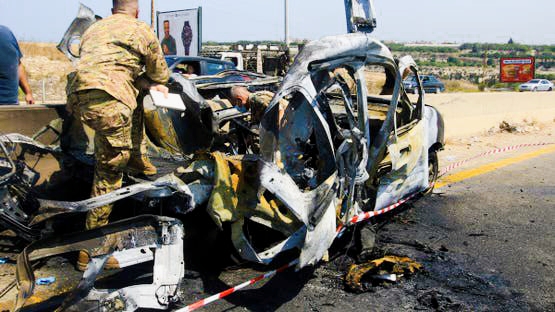The Israeli army announced yesterday, Friday, the execution of an airstrike targeting southern Lebanon, resulting in the death of Mohammed Hamza Shahada, a prominent leader in Hezbollah and the head of the intelligence apparatus of the "Radwan" forces, the elite unit affiliated with the party.
A statement from the army indicated that the strike was carried out yesterday morning by an Israeli Air Force aircraft, targeting a vehicle in which Shahada was traveling in the Adloun area of the Nabatieh governorate.
The statement clarified that Shahada played a pivotal role during the recent confrontations between Hezbollah and Israel, overseeing the combat and operational readiness of the "Radwan" forces.
The Israeli army accused Shahada of violating ceasefire agreements between Israel and Lebanon through his intelligence and operational activities, noting that his assassination is part of a broader campaign aimed at undermining Hezbollah's military infrastructure in Lebanon.
For its part, the Lebanese Ministry of Health confirmed the death of one person in the airstrike that targeted a "Rapid" vehicle on the highway connecting the cities of Sidon and Tyre, according to the National News Agency.
Social media users circulated images and condolence statements issued by Hezbollah confirming the death of one of its members in the Israeli attack.
This development comes less than 24 hours after a series of Israeli airstrikes targeted areas in eastern Lebanon, resulting in seven fatalities, including six in a single airstrike that targeted the Masnaa road, leading to the main border crossing with Syria.
Despite the ceasefire agreement being in effect, Israel continues to carry out military operations within Lebanese territory, focusing on sites and facilities belonging to Hezbollah, including weapon depots and field command centers, amid threats to expand the scope of attacks unless the party's weapons are surrendered.
In this context, the Lebanese government tasked the army last Tuesday with preparing a comprehensive plan for disarming Hezbollah, setting the end of this year as the deadline for its implementation, a step that Hezbollah firmly rejects, considering it to serve the interests of the "Israeli enemy".
Informed American sources describe the situation in Lebanon as "extremely sensitive," praising what they termed as the "significant steps" taken by the Lebanese government in an attempt to contain the escalation.

